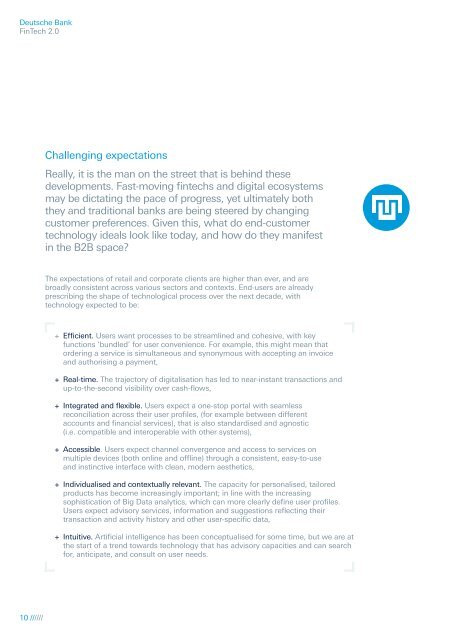FinTech 2.0
YKHHI
YKHHI
Create successful ePaper yourself
Turn your PDF publications into a flip-book with our unique Google optimized e-Paper software.
Deutsche Bank<br />
<strong>FinTech</strong> <strong>2.0</strong><br />
Challenging expectations<br />
Really, it is the man on the street that is behind these<br />
developments. Fast-moving fintechs and digital ecosystems<br />
may be dictating the pace of progress, yet ultimately both<br />
they and traditional banks are being steered by changing<br />
customer preferences. Given this, what do end-customer<br />
technology ideals look like today, and how do they manifest<br />
in the B2B space?<br />
The expectations of retail and corporate clients are higher than ever, and are<br />
broadly consistent across various sectors and contexts. End-users are already<br />
prescribing the shape of technological process over the next decade, with<br />
technology expected to be:<br />
+ + Efficient. Users want processes to be streamlined and cohesive, with key<br />
functions ‘bundled’ for user convenience. For example, this might mean that<br />
ordering a service is simultaneous and synonymous with accepting an invoice<br />
and authorising a payment,<br />
+ + Real-time. The trajectory of digitalisation has led to near-instant transactions and<br />
up-to-the-second visibility over cash-flows,<br />
+ + Integrated and flexible. Users expect a one-stop portal with seamless<br />
reconciliation across their user profiles, (for example between different<br />
accounts and financial services), that is also standardised and agnostic<br />
(i.e. compatible and interoperable with other systems),<br />
+ + Accessible. Users expect channel convergence and access to services on<br />
multiple devices (both online and offline) through a consistent, easy-to-use<br />
and instinctive interface with clean, modern aesthetics,<br />
+ + Individualised and contextually relevant. The capacity for personalised, tailored<br />
products has become increasingly important; in line with the increasing<br />
sophistication of Big Data analytics, which can more clearly define user profiles.<br />
Users expect advisory services, information and suggestions reflecting their<br />
transaction and activity history and other user-specific data,<br />
+ + Intuitive. Artificial intelligence has been conceptualised for some time, but we are at<br />
the start of a trend towards technology that has advisory capacities and can search<br />
for, anticipate, and consult on user needs.<br />
10 //////


